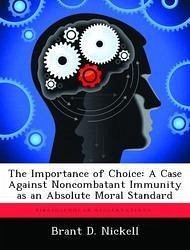Just War Theory offers two basic mandates for the conduct of war--that attacks must not cause collateral or incidental damage disproportionate to the military gain realized, and that attacks must discriminate between combatants and noncombatants. The language of international law, as set forth in the Geneva Conventions and Rome Statute of the International Criminal Court, seconds these time- and experience-honed principles of jus in bello. However, neither "mainstream" just war theory (the body of generally-accepted affirmations) nor international law is sufficiently definitive to remove all moral ambiguity from targeting decisions. Further, despite concerted efforts to minimize noncombatant fatalities during recent armed conflicts, these types of casualties clearly persist. As a result, some Just War commentators argue for a more stringent interpretation of the jus in bello principles, and question the moral acceptability of planned attacks that pose foreseeable risk to noncombatants.
Hinweis: Dieser Artikel kann nur an eine deutsche Lieferadresse ausgeliefert werden.
Hinweis: Dieser Artikel kann nur an eine deutsche Lieferadresse ausgeliefert werden.








